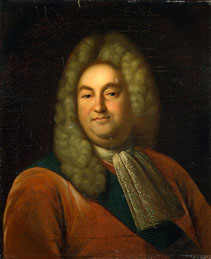
Peter Shafirov
Encyclopedia

Baron
Baron is a title of nobility. The word baron comes from Old French baron, itself from Old High German and Latin baro meaning " man, warrior"; it merged with cognate Old English beorn meaning "nobleman"...
Peter Pavlovich Shafirov (1670–1739), Russia
Russia
Russia or , officially known as both Russia and the Russian Federation , is a country in northern Eurasia. It is a federal semi-presidential republic, comprising 83 federal subjects...
n statesman, one of the ablest coadjutors of Peter the Great
Peter I of Russia
Peter the Great, Peter I or Pyotr Alexeyevich Romanov Dates indicated by the letters "O.S." are Old Style. All other dates in this article are New Style. ruled the Tsardom of Russia and later the Russian Empire from until his death, jointly ruling before 1696 with his half-brother, Ivan V...
.
Shafirov was born into the family if Pavel Shafirov, a translator in the Russian Foreign Office, of Polish Jewish extraction. Pavel Shafirov's parents were residents of Smolensk
Smolensk
Smolensk is a city and the administrative center of Smolensk Oblast, Russia, located on the Dnieper River. Situated west-southwest of Moscow, this walled city was destroyed several times throughout its long history since it was on the invasion routes of both Napoleon and Hitler. Today, Smolensk...
, they converted to Russian Orthodox Christianity after Smolensk was ceded to Russia by Poland in 1654.
Peter Shafirov first made himself useful by his extraordinary knowledge of foreign languages. He was the chief translator in the Russian Foreign Office for many years, subsequently accompanying tsar Peter on his travels. Made a baron
Baron
Baron is a title of nobility. The word baron comes from Old French baron, itself from Old High German and Latin baro meaning " man, warrior"; it merged with cognate Old English beorn meaning "nobleman"...
and raised to the rank of vice-chancellor
Chancellor
Chancellor is the title of various official positions in the governments of many nations. The original chancellors were the Cancellarii of Roman courts of justice—ushers who sat at the cancelli or lattice work screens of a basilica or law court, which separated the judge and counsel from the...
, he displayed diplomat
Diplomat
A diplomat is a person appointed by a state to conduct diplomacy with another state or international organization. The main functions of diplomats revolve around the representation and protection of the interests and nationals of the sending state, as well as the promotion of information and...
ic talents of the highest order.
During the unlucky campaign of 1711, he succeeded against all expectations in concluding the peace of the Pruth. Peter left him in the hands of the Turks
Ottoman Empire
The Ottoman EmpireIt was usually referred to as the "Ottoman Empire", the "Turkish Empire", the "Ottoman Caliphate" or more commonly "Turkey" by its contemporaries...
as a hostage, and on the rupture of the peace he was imprisoned in the Seven Towers. Finally, however, with the aid of the British and Dutch ambassadors, he defeated the diplomacy of Charles XII of Sweden
Charles XII of Sweden
Charles XII also Carl of Sweden, , Latinized to Carolus Rex, Turkish: Demirbaş Şarl, also known as Charles the Habitué was the King of the Swedish Empire from 1697 to 1718...
and his agents, and confirmed the good relations between Russia and Turkey by the treaty of Adrianople (June 1713).
On the institution of the colleges or departments of state in 1718, Shafirov was appointed vice-president of the department of Foreign Affairs, and a senator
Governing Senate
The Governing Senate was a legislative, judicial, and executive body of Russian Monarchs, instituted by Peter the Great to replace the Boyar Duma and lasted until the very end of the Russian Empire. It was chaired by the Ober-Procurator...
. In 1723, however, he was deprived of all his offices and sentenced to death. The capital sentence was commuted on the scaffold to banishment, first to Siberia
Siberia
Siberia is an extensive region constituting almost all of Northern Asia. Comprising the central and eastern portion of the Russian Federation, it was part of the Soviet Union from its beginning, as its predecessor states, the Tsardom of Russia and the Russian Empire, conquered it during the 16th...
and then to Novgorod. Embezzlement and disorderly conduct in the senate were the offences charged against Shafirov, and with some justice. On the death of Peter, Shafirov was released from prison and commissioned to write the life of his late master.
He had previously (1717), in an historical tract on the war with Charles XII, in which Peter himself collaborated, epitomized, in a high panegyric style, some of the greatest exploits of the tsar-regenerator. The successful rivalry of his supplanter, Andrei Osterman
Andrei Osterman
Count Andrey Ivanovich Osterman was a German-born Russian statesman who came to prominence under Tsar Peter I of Russia and served until the accession of the Tsesarevna Elizabeth. His foreign policy was based upon the Austrian alliance...
, prevented Shafirov from holding any high office during the last fourteen years of his life.

